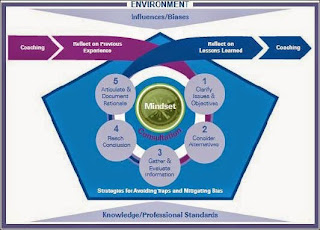A course on Professional Judgment and Decision Making
is offered by the Harvard Kennedy
School. It states that:“Professionals who work in government, business, the
legal system, medicine, and many other settings make critically important
decisions every day. Whom should our organization hire? How much financial risk
can we tolerate? How should we structure accountability systems? Taking this
course will help you to make such decisions in a less biased and more
systematic way. It will also help you understand the underlying psychology of
the mind. More specifically, it will help you understand when and why humans
depart from standards of accuracy and rationality in judgment and decision
making.”
The course topics include (a) basic mental processes in
perception, memory and context dependence; (b) how questions affect answers;
(c) models of decision making; (d) heuristics and biases; (e) social and group
influences; (f) common traps; and (g) debiasing techniques. It also discusses
emotion. The lectures and discussions are coordinated to complement weekly
readings, which draw from primarily from psychology, as well as behavioral
economics and neuroscience.
Throughout the course, the overarching goals are to: (1) Learn about the academic field of judgment and decision
making, its major theories, results and debates. (2) Become a critical consumer of research findings,
learning: (a) how to identify behavioral science studies on a given topic and
(b) the methodological standards for evaluating the soundness of such studies. (3) Develop the ability to effectively write and speak about
behavioral science theories, results and debates. (4) Acquire practical skills for improving your own
judgments and decisions. (5) Acquire knowledge of which biases individuals can fix
with training/knowledge and which biases individuals cannot fix unless managers
engage in institutional design. (6) Develop a capstone project in which you apply the
material in a way that will improve professional decision-making processes.
Possible selections include legal process, government institutions, medical
settings and other areas where high stakes decisions are made regarding policy.
To learn more, refer to previous posts on Teaching
Professional Judgment and Decision Making.

